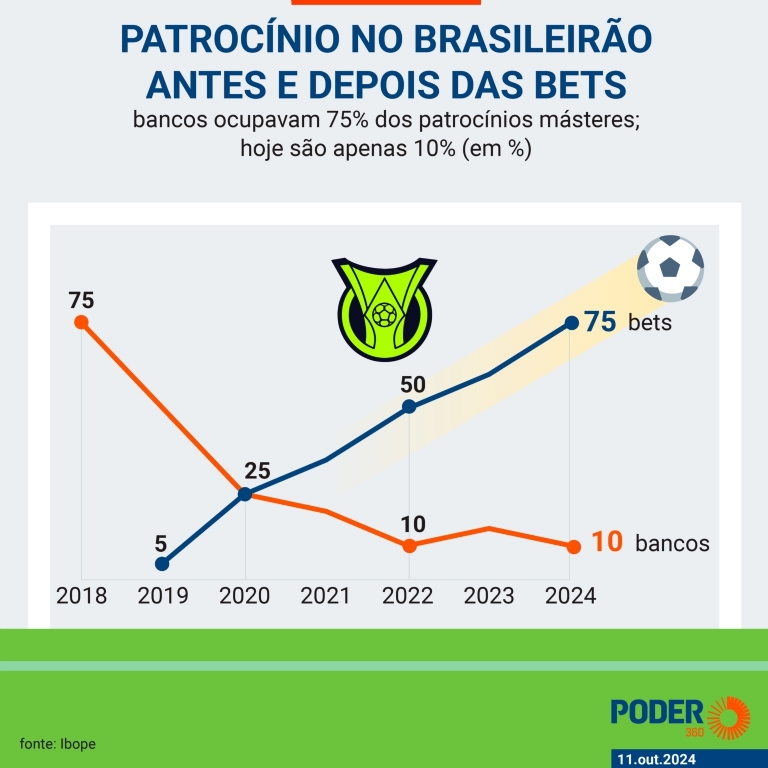Like every crisis, the betting crisis has an expiration date. Eventually, the topic becomes tiresome. Companies that support responsible gambling, remove vulnerable people from their databases, and adopt strict compliance rules will survive. This is the opinion of journalist and founder of Press FC, Fernando Mello, in an article for Poder360. "The hypocrisy is so great that, every day, it is possible to find reports in major portals highlighting problems of the bets flanked by advertisements for them.
Brazil is indeed a curious country. Just at the moment when regulation is being enforced and there is an attempt to strictly control what has been unregulated in the country for almost a decade, betting has overnight become the biggest villain for the health and economy of Brazilians.
While the billion-dollar activity operated in the shadows, with headquarters in tax havens precisely because of the prohibition of establishing themselves here, terms like gambling addiction or betting addiction were not mentioned in the press. Since it was not a government issue, the problem remained hidden under the carpet, as if it simply did not exist, without generating a cent of tax.
It was enough for the government to set clear rules, in meticulous and competent work led by lawyer José Francisco Manssur at the Ministry of Finance, for the media to discover that sports or gambling games can be addictive.
It is the typical case of selective discovery that periodically plagues the media. For at least 7 years, bets have invaded TV, radios, and newspapers, without any questioning. You can count on one hand the journalists who have positioned themselves against betting.
Before the generalized artillery organized by public opinion, Lula was eyeing the potential of R$ 3 billion in revenue. Now, Minister Fernando Haddad and the president himself say there is an epidemic of betting addicts and show concern about something that is a global problem.
Here are some important questions:
* Did the government only see gambling addiction now?
* Isn't the media also responsible for the increase in the number of addicts due to the overexposure of bets?
* Which will be the first media outlet to make a mea culpa?
The hypocrisy is so great that, every day, it is possible to find reports in major portals highlighting problems of betting houses flanked by advertisements for betting houses.
According to a survey by the newspaper O Estado de S. Paulo published in March 2023 and replicated in a recent study by Banco Itaú, the houses poured (or injected) R$ 3.5 billion into Brazilian football. As the study is prior to the entry (and exit) of Vai de Bet in Corinthians, which had an inflationary effect in cascade on club advertising, the numbers in 2024 are expected to exceed R$ 4 billion.
The first significant sponsorship of the sector in Brazilian football was in December 2018, at Fortaleza. Without the government of Jair Bolsonaro (PL) acting to create clear rules, bets became the main source of sponsorship for the biggest Brazilian passion.
Among the 40 clubs of Serie A and B of the Brazilian Championship, only Palmeiras and Cuiabá do not display a company from the industry. In women's football, however, Palmeiras has already joined. The two main championships of the Brazilian Football Confederation (CBF) have Betano as the holder of the naming rights.
The investment in media outlets also reached the billions. According to Ibope Monitor, open TV concentrated 44% of the bets' funds, with more than R$ 921 million. The total spent on media was over R$ 2,071 billion in 2023, a number that will certainly increase in 2024.
A sectoral image crisis, as we know, does not happen by chance. There are huge interests from banks, retail, and other industries to curb the population's spending on sports games. The money is the same. The more one sector grows, the less there is for the others.
It is evident that bets must review some concepts and effectively work to combat addiction. Today, technology allows for account tracking, data crossing. It does not seem reasonable that beneficiaries of the Bolsa Família can use public resources to gamble. Or that people with bad credit can see in the illusion of easy money a way to solve their debts. Sports betting is entertainment, not a means to get rich.
Like every crisis, the betting crisis has an expiration date. Eventually, the topic becomes tiresome. Companies that effectively support responsible gambling, remove vulnerable people from their databases, and adopt strict compliance and security rules will survive.
In the past, society's enemies were cigarettes, beer, banks, construction companies. Tobacco still kills. Alcohol continues to destroy families, generating violence. Interest rates keep making bankers billionaires at the expense of the misery of millions of people. No one in their right mind can say that corruption in public works has disappeared. Only one thing has changed, the public's frenzy to destroy the villain of the moment. The hysteria will end soon.
Fernando Mello
Journalist, and crisis management and sports industry expert. Graduated from the University of São Paulo and post-graduated in Sports Management, the professional had an eight-year stint as a reporter and columnist at Folha de S. Paulo and has been leading the Press FC agency since 2004. He is vice-president of the São Paulo Football Federation and won seven Cannes Lions in 2019.










